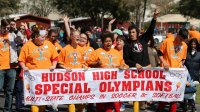Recalling and Rekindling the Spirit that Initiated Special Olympics
The spirit of Special Olympics needs emulation so that doors are more widely open for all — in schools and social institutions.
Your content has been saved!
Go to My Saved Content.The World Special Olympics -- held in Los Angeles in 2015 and next up, in Austria, 2017 -- first came of age July 20, 1968 on Chicago's Soldier Field. The words spoken at the start of those first games, "Let me win. But if I cannot win, let me be brave in the attempt," came from the heart of Eunice Kennedy Shriver only six weeks after the death of her brother, Robert F. (Bobby) Kennedy, who was gunned down by an assassin.
She was propelled past her grief by her relationship with her sister, Rosemary, who experienced intellectual disabilities, and the many young people she and her husband, Sargent Shriver, brought into their home on weekends and during the summer. At Camp Shriver -- their home -- Eunice created opportunities for youth with intellectual disabilities to compete and excel in sports in ways that provided them with just the right amount of challenge.
Special Olympics was, and continues to be, an action structure to inspire a change in how disabilities of all kinds are understood by those affected, their families, and the general public. Eunice Shriver wanted to focus on the ways in which those with intellectual disabilities were misunderstood, feared, discounted, and rejected by society.
Widen the lens from Chicago, July 1968, and look at the United States now. Eunice Shriver's words were prescient. We have not yet fully accepted those with intellectual disabilities, nor have we fully accepted a young immigrant struggling to understand the English language and American culture, or a teenager who is of color and living in poverty. To Eunice Shriver, all of these individuals are capable of expressing and receiving love, possess abilities, and have no less human dignity than those who otherwise might be passing judgment upon them.
In writing about his mother's drive to create Special Olympics in Fully Alive: Discovering What Matters Most, Timothy Shriver recalls:
The Power in a Motto
As Tim Shriver has noted, "let me win" means give me a real chance to be successful at something. "If I cannot win" does not mean to expect failure, but rather it is a call to recognize honest effort, regardless of outcomes. And being "brave in the attempt" means that striving must always be appreciated, and the debilitating effects of negative labeling must be avoided.
For youth with intellectual disabilities, as well as other youth at physical, social, or emotional disadvantage, the situation is particularly dire. "The predatory lions of life" await them. They languish under labels of failure. They are in danger when their schools are seen as more worthy of closing than saving, shifting their futures toward un-or underemployment and the likelihood of dropping out from higher education.
Where are their opportunities to win, and if not winning, to be brave in the attempt? Where are they affirmed for their strengths and gifts? If we think about it, this happens much too rarely in schools and also too rarely in organized social institutions in their communities. Even religious institutions scripturally sensitive to the plight of the poor and "the stranger" are including too few of either. However, gangs, for example, provide a perceived positive outlet for too many.
A Movement Worth Modeling
Since Eunice Shriver's brave call in 1968, we have made progress, but we continue to fail hundreds of thousands of young people and their loved ones, and this failure will reverberate into future generations.
The Special Olympics movement -- a name chosen with extraordinary care and insight to minimize stigma -- has shown that it is both necessary and possible to reaffirm the essential humanity that comes with birth and is not lost when reasons of biology, accident, or otherwise make one's developmental trajectory "atypical."
Until and unless we transform education to embody this reaffirmation and provide every student with a chance to win or be brave in the attempt, public education will not produce the citizens we aspire to have, nor the citizens our democracy needs if it is to heal and progress.
The spirit of Special Olympics needs emulation so that more doors are opened wider to all, effortful participation is met with appreciation, and the bravery many need to get by in everyday life is acknowledged and supported while inequities are eroded.
